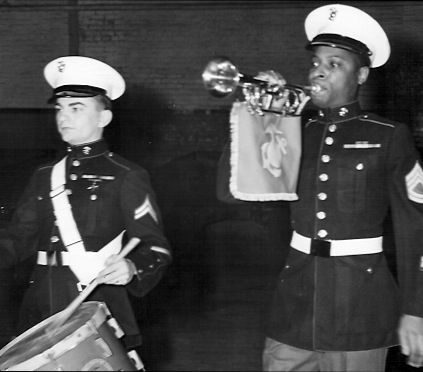Sheryl Corke

On the eve of the 238th birthday of the United States Marine Corps, I must say that my knowledge of the history of African Americans in this country was learned through the lens of my father, the late Retired Gunnery Sgt. Percy L. Corke (1920-2009), who was one of the 20,000 black men who desegregated the Marine Corps at Montford Point camp, Jacksonville, North Carolina. These men were trained in a segregated camp. They were not even allowed to be on the actual Marine Corp base, Camp Lejeune, without a white officer. I was one of the first black children “allowed” to be born at the Naval Hospital at Camp Lejeune, NC. While in labor, my mother said they would not give her any pain relief because “Negro gals” were known to be “tough breeders.” I grew up with some of the Marine Corps’ finest (Kidd, Harrington, Grinstead, McDowd, McCargo and Mason) as my babysitters or frequenters to my family home. When we moved to different places, everything that my brother and I did was preceded with the admonition to “Be the BEST” because you represent your father, a Marine. My dad and his peers at Montford Point suffered through hell as they tried to advance up the ranks. My dad once caught guard duty for weeks at the most remote corner of the base because he refused his superior officer’s request to have my mother, a graduate of Alcorn A&M, serve as a maid to his wife. However, there are many who respect the uniform. Once, when we were traveling by car to CA, we were very low on gas and would not be able to cross the Salt Lake desert. My father stopped the car, changed into his khaki uniform and went to a gas station. The man allowed him to gas up and referred him to a motel that would take “coloreds.” When we moved to San Francisco, my parents could not buy a house in many areas. When they finally purchased one, one of the neighbors painted a swastika on the front door, which caused the other neighbors to rise up in defense of my father, to whom they referred as a “fine Negro military man.” In the late 50s and 60s, I watched my parents agonize over what was going on in the South, particularly in Mississippi where they were from. Not until I got much older did I understand what they lived through. Now, living voluntarily in Alabama, I see the history of my people each time I set foot out of my door and pass the cotton fields and the homes and businesses owned by black folks. My parents passed on to me dignity, respect for education, pride of home ownership and the knowledge that their struggles and tribulations paved the way for me, and my own paved the way for those who came after me. My dad, the Gunny, was fiercely proud of being a Marine and always carried himself as such. He saw himself as an integral part of the history of America and when the Montford Point Marines received authorization to receive the Medal of Honor in 2011, his achievements were vindicated. Semper fi!




